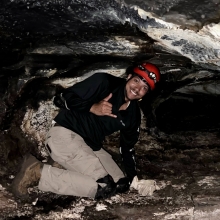
he/him
Bio
Christian Estrada is a William Fontaine Fellow pursuing the study of African Diaspora Archaeology. He hopes to analyze how African diaspora materiality informs us of ascribed and achieved identities. Specifically, he intends to study regional differences in the everyday lived experiences of inner-city African Americans via community-engaged/public archaeological and interdisciplinary research methods to emphasize and thoroughly contextualize the communities' compelling experiences.
In the spring of 2022, he graduated from Wake Forest University as a first-generation college student with a Bachelor of Arts in anthropology and minors in cultural heritage and preservation studies and biology. Throughout his studies, research projects, and job responsibilities at Wake Forest, he gravitated toward identities impacted by racial and social injustices.
Following graduation, he continued to analyze and support identities impacted by racial and historical social injustices within Washington, D.C., and later in Hawaiʻi. Christian interned under the District Archaeologist at the DC Historic Preservation Office, where he engaged with what he called “the overwhelming reactionary nature of the NHPA process,” learning how it shapes federally funded projects, enforces heritage management, and can protect and preserve cultural resources. For the last two years, he worked as a Cultural Resources Technician for the Center of Environmental Management of Military Land (CEMML) on the island of Oahu. While working as a cooperator for the U.S. Army and the Federal government, he prioritized “advocating for Hawaiian and minority cultural practices, traditions, values, and material culture.” Within both spaces, he witnessed the abundance of unprocessed material culture extracted from varying data recovery missions, which ended up in repositories. Although he does not know exactly where his future research will transpire, he wants to “include legacy collections and advocacy for BIPOC narratives.”
Christian says, “I’m fortunate to be in the field at a time with a representation of Black, Indigenous, People of Color (BIPOC), and Ally scholars who have created a space for me to utilize our discipline to correct/create an accurate narrative surrounding minority communities.” In addition, he wanted to acknowledge that he is here today because of his “family, friends, mentors, professors, teachers, colleagues, and last but certainly not least the descendant communities” who have made him who he is today!
Education
B.A. in Anthropology with minors in Cultural Heritage & Preservation Studies and Biology, Wake Forest University (2022)
Research Interests
Historical archaeology, diaspora studies, materiality, heritage studies, racial and social injustices, Community Engagement/ Public Archaeology, Ethics in archaeological practice, Cultural Resource Management, and associated Laws/ Regulations.

 Department of Anthropology
Department of Anthropology